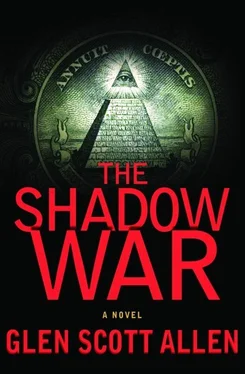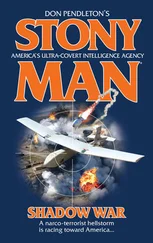Glen Allen - The shadow war
Здесь есть возможность читать онлайн «Glen Allen - The shadow war» весь текст электронной книги совершенно бесплатно (целиком полную версию без сокращений). В некоторых случаях можно слушать аудио, скачать через торрент в формате fb2 и присутствует краткое содержание. Жанр: Триллер, на английском языке. Описание произведения, (предисловие) а так же отзывы посетителей доступны на портале библиотеки ЛибКат.
- Название:The shadow war
- Автор:
- Жанр:
- Год:неизвестен
- ISBN:нет данных
- Рейтинг книги:5 / 5. Голосов: 1
-
Избранное:Добавить в избранное
- Отзывы:
-
Ваша оценка:
- 100
- 1
- 2
- 3
- 4
- 5
The shadow war: краткое содержание, описание и аннотация
Предлагаем к чтению аннотацию, описание, краткое содержание или предисловие (зависит от того, что написал сам автор книги «The shadow war»). Если вы не нашли необходимую информацию о книге — напишите в комментариях, мы постараемся отыскать её.
The shadow war — читать онлайн бесплатно полную книгу (весь текст) целиком
Ниже представлен текст книги, разбитый по страницам. Система сохранения места последней прочитанной страницы, позволяет с удобством читать онлайн бесплатно книгу «The shadow war», без необходимости каждый раз заново искать на чём Вы остановились. Поставьте закладку, и сможете в любой момент перейти на страницу, на которой закончили чтение.
Интервал:
Закладка:
Mostly, however, they watched the passing landscape, read newspapers they bought in stations along the way, and, inevitably, talked about the whole khren in which they'd become entangled.
"I've been thinking about these 'wobbles' Jeremy discovered," Benjamin said one night as they passed through a countryside utterly devoid of city lights of any kind. "It's just hard for me to understand how people, then or now, could manufacture enemies and a war just to remain in power. It seems… inhuman."
"Or perhaps all too human," Natalya replied. She was sitting next to him, had been resting her head on his shoulder. Now she sat up.
"Our whole history is of people willing to do anything to stay in power. Everyone was a potential enemy, everything was a possible plot against the Soviet people."
"For years before World War the Second, Stalin had told the people that the Nazis were their enemies. But when Molotov signed the nonagression pact with Germany, in a single day suddenly Germany became our friend, and Britain our enemy. They were told it was all part of Father Stalin's grand strategy. And they accepted this lie without question."
She took a page from the London Times Benjamin had been reading, drew a diagram.
"This picture was distributed on millions of leaflets handed out in Moscow and Leningrad."
"You see?" she said. "Instead of letting Churchill pit the Soviets against the Nazis, allowing the British to stay above the fray, Stalin wanted people to believe the nonaggression pact forced London into that role, leaving the Soviets on top."
"Interesting," said Benjamin, thoughtfully examining Natalya's drawing.
"Understandable?" she asked.
"No… I mean yes. It's just that, well, I've seen something before, something that reminds me of your little triangles."
And then he told her about how Nabil Hassan had interpreted the symbol he'd found in the engraving of Horatio Gates: as a secretive power bringing two enemies into conflict, then, he'd put it, "sitting back in silence."
"Whether the Gray Cardinals are from your Revolution or ours," said Natalya firmly, "their methods are always the same."
"I just don't…" His voice trailed off.
"What?" Natalya prodded.
"If our Gray Cardinals were behind the Newburgh conspiracy two centuries ago…" He paused, then looked up at her. "What happened to them?"
"When the 1905 revolution failed," Natalya said, "most of the Bolsheviks were arrested and exiled. But the ones who escaped went underground. They had struck too soon. They needed to wait for better times. Or, as was the case, worse times." Her eyes became quite steely. "Perhaps your American conspirators were similarly slumbering. Waiting."
Benjamin smiled at her. "You are the professional paranoid." He tried to make his voice sound teasing, playful-but it was a distraction.
For at that moment, Benjamin had his first suspicion of what Scenario 55 might have been all about.
And, if he was right, it was monstrous.
Once they reached Achinsk, they had to give up that private compartment and the relatively luxurious accommodations of the Trans-Siberian Railway, and switch to a small commuter train for the final leg to Uzhur.
In Achinsk, Natalya saw a notice that a new, modern express rail service was coming soon to the Achinsk-Uzhur line.
"How things have changed," she said. "When I was a child, even this train was a secret."
As they moved deeper into southeastern Siberia and closer to the Chinese border, Benjamin noticed that the landscape became pockmarked, as though it had been bombarded eons before by giant cannonballs.
"Something like that," said Natalya. She explained to him that modern geologists knew this part of Siberia as one of the densest asteroid impact areas on all Earth. She opined that this was something the oldest locals understood on some instinctive level, for Uzhur had always been considered a place of dark, supernatural power. It was said that he who controlled Uzhur controlled all of Northern Asia.
But for all its supposed mystical power, the civilian Uzhur proved to be a very small town, indeed; one of only 17,000 inhabitants. To Benjamin, it looked like photographs he'd seen of old Western mining towns, with one-story houses and public buildings scattered intermittently, separated by rickety wooden fences and small kitchen gardens. Only the main roads were paved; the rest were rough lanes of dirt and gravel barely wide enough for a single car.
They asked at the train station for directions to Boris Silma's. The stationmaster knew Silma, and it was clear from the look he gave them that, if they were there to see "Bear" Boris, he assumed they were on some sort of illicit business. Looking simultaneously curious and disapproving, he told them that they could call Silma from the station phone; the twenty-dollar bill Benjamin gave him seemed to still his suspicions.
Natalya made the call. She spoke in rapid Russian, and something Boris said made her go very quiet. Then she said a few more words, said, "Harasho, spasiba," and hung up.
She came to Benjamin. She looked stricken.
"Nikolai is not here," she said. "He called Boris from Dubna, said to expect him two days ago. But he has not arrived."
Benjamin held her arms. "Perhaps it's nothing," he said. "Perhaps he just couldn't get a flight, or he was delayed."
"Perhaps," said Natalya, but it was clear she didn't believe him. "I will call him from Boris's house."
They waited for Boris outside the station. It was cold here; not just chilly, but the kind of cold that Benjamin could feel even through his thick parka. There was no deep snow yet-Natalya said the streets would soon be impassable and everyone would move about on skis-but there were patches of snow everywhere and frost on the trees and rooftops.
By the time Boris arrived in a battered and rusting hardtop UAZ Russian jeep, Benjamin was beginning to feel like his face was an icicle. The vehicle clearly had a military past: where there was still paint, it was a drab olive green; where there was not, there was either orange rust or patches of black undercoat.
Boris bounded out of the jeep, swept Natalya up in his arms, kissing her on both cheeks and speaking in a torrent of Russian. Benjamin could see why his nickname was Bear: Boris was over six and a half feet tall, thick limbed, and with a heavy black-and-gray beard.
When Boris was done greeting Natalya-he'd looked slightly askance at her brunette hair but said nothing about it-he turned to Benjamin, removed his glove, and offered his hand. Benjamin removed his as well-he instantly felt the cold work into his exposed fingers-and Boris took it in an almost painful grip.
"Greetings to my country!" Boris said. "Welcome, America!"
"Thank you," Benjamin said, feeling his hand beginning to go numb. "Spasiba."
"Ah!" Boris's face lit up. "Vy govorite po russiki?"
"No," Benjamin said. "Two words: spasiba and privet."
Boris looked somewhat taken aback, then smiled broadly. "Is okay. I speak American."
He gathered their two bags and tossed them into the back of the jeep. Natalya climbed into the cramped front seat and Benjamin, pushing aside boots and traps and boxes of loose rifle ammunition, climbed into the back.
As they bounced over the dirt roads of Uzhur, and then the even rougher outskirts where Boris lived, Boris and Natalya carried on a conversation. Benjamin couldn't understand specifics, but it was clear they were discussing Nikolai's failure to arrive in Uzhur.
Boris's house was in truth a one-story cabin. "Is only for business," Boris said, removing their bags from the jeep. "Real house in Achinsk." He didn't explain what sort of business he conducted from a wooden cabin in the wild woods far outside Uzhur.
Читать дальшеИнтервал:
Закладка:
Похожие книги на «The shadow war»
Представляем Вашему вниманию похожие книги на «The shadow war» списком для выбора. Мы отобрали схожую по названию и смыслу литературу в надежде предоставить читателям больше вариантов отыскать новые, интересные, ещё непрочитанные произведения.
Обсуждение, отзывы о книге «The shadow war» и просто собственные мнения читателей. Оставьте ваши комментарии, напишите, что Вы думаете о произведении, его смысле или главных героях. Укажите что конкретно понравилось, а что нет, и почему Вы так считаете.












